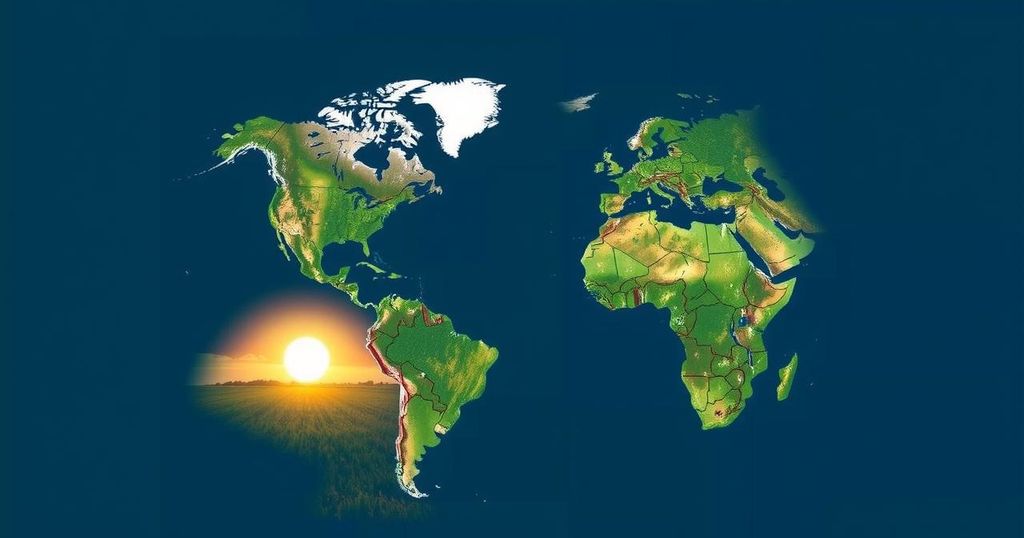At COP29, developing nations reacted with outrage to a newly agreed $300 billion annual financing target, deemed insufficient against the $1.3 trillion required for climate resilience. While some perceived the pledge as a positive step, many critics pointed to a lack of guarantees for grant funding and voiced concerns over increasing debt risks. The negotiations highlighted the need for a more robust and equitable climate finance structure to address emerging climate challenges effectively.
At the COP29 climate summit in Azerbaijan, the adoption of a $300 billion annual financing goal aimed at aiding developing nations in adapting to climate change has triggered significant disappointment among Global South representatives. Although the funding is an increase from the long-standing $100 billion agreement initiated in 2009, many argued that the new figure falls woefully short of the $1.3 trillion needed yearly to address the urgent demands of climate resilience and emissions reductions in vulnerable countries.
The summit concluded with expressions of outrage, particularly from nations such as India and Cuba, which described the commitment as insufficient and akin to ‘environmental colonialism’. Indian negotiator Chandni Raina deemed the amount ‘abysmal’, while others noted that, after adjusting for inflation, the new pledge does not meet prior commitments. Critics highlighted that the incorporation of private funding sources could lead to increased debt for less affluent nations, rather than sustainable financial solutions in the form of grants.
In contrast, some representatives from Western nations characterized the $300 billion target as ambitious and a significant step forward in climate finance. The agreement permits the use of both public and private capital for climate initiatives in developing countries. However, the necessity for public grants remains a consistent demand from Global South nations, who expressed deep frustration during negotiations, culminating in some walking out in protest.
Independent experts underscored the inadequacy of the funding target, given the intensifying climate crises evidenced this year by widespread disasters, such as significant floods and droughts globally. Germany, France, and the U.S. made substantial pledges to adaptation funds, but historical commitment shortcomings persist, with over $122 million in pledged support currently unfulfilled.
Looking ahead to COP30 in Belem, Brazil, nations are expected to arrive at a carbon trading framework and strive towards enhancing financial support channels. The forthcoming discussions will be crucial as nations face the February deadline for submitting updated climate plans. Critics anticipate that many nations may not meet these deadlines, raising further concerns over accountability and transparency in climate funding commitments.
The overall sentiment among developing nations reflects a profound sense of betrayal and a call for more robust and equitable financing for climate adaptation strategies.
Globally, climate change has exacerbated vulnerabilities for developing nations, creating an urgent need for comprehensive financial support to mitigate climate impacts. Historically, developed nations, particularly those in the Global North, have contributed significantly to greenhouse gas emissions, necessitating their role in providing substantial financial aid for climate adaptation. Despite ongoing commitments, the financial assistance provided has consistently fallen short, prompting calls for reforms in how climate financing is structured to adequately meet the needs of those most affected by climate disasters. The discourse around funding mechanisms highlights the tension between grants versus loans, setting the stage for contentious negotiations at international climate summits like COP29.
The COP29 summit has underscored the complex dynamics of climate finance, revealing stark contrasts between the aspirations of developing nations and the commitments of developed countries. The announced $300 billion yearly target, while an increment from past agreements, is viewed as inadequate in light of the estimated $1.3 trillion needed for effective climate action. With growing impatience expressed by negotiators from vulnerable countries, the path forward remains fraught with challenges in ensuring that financial pledges translate into substantive support for climate adaptation, especially as the global community anticipates the next COP meeting in Brazil.
Original Source: www.voanews.com






